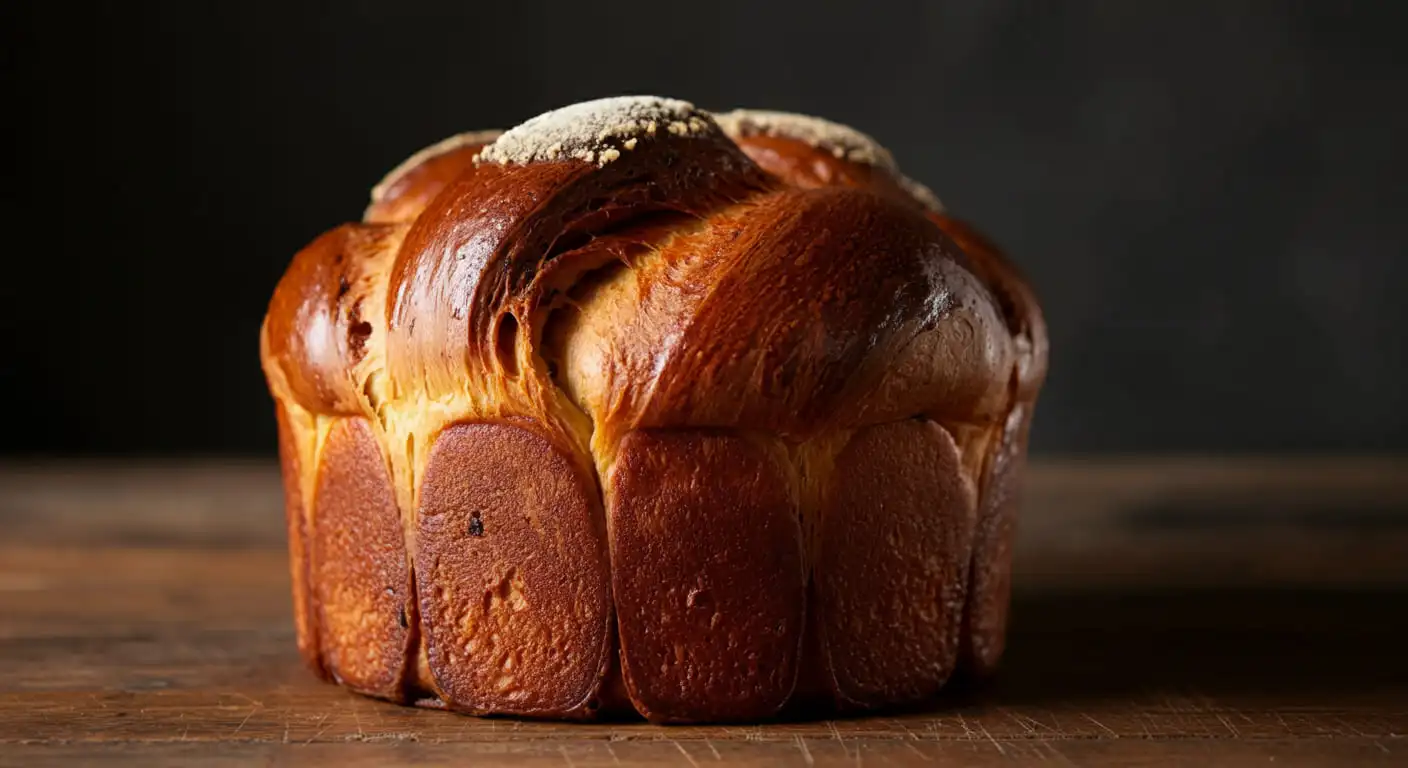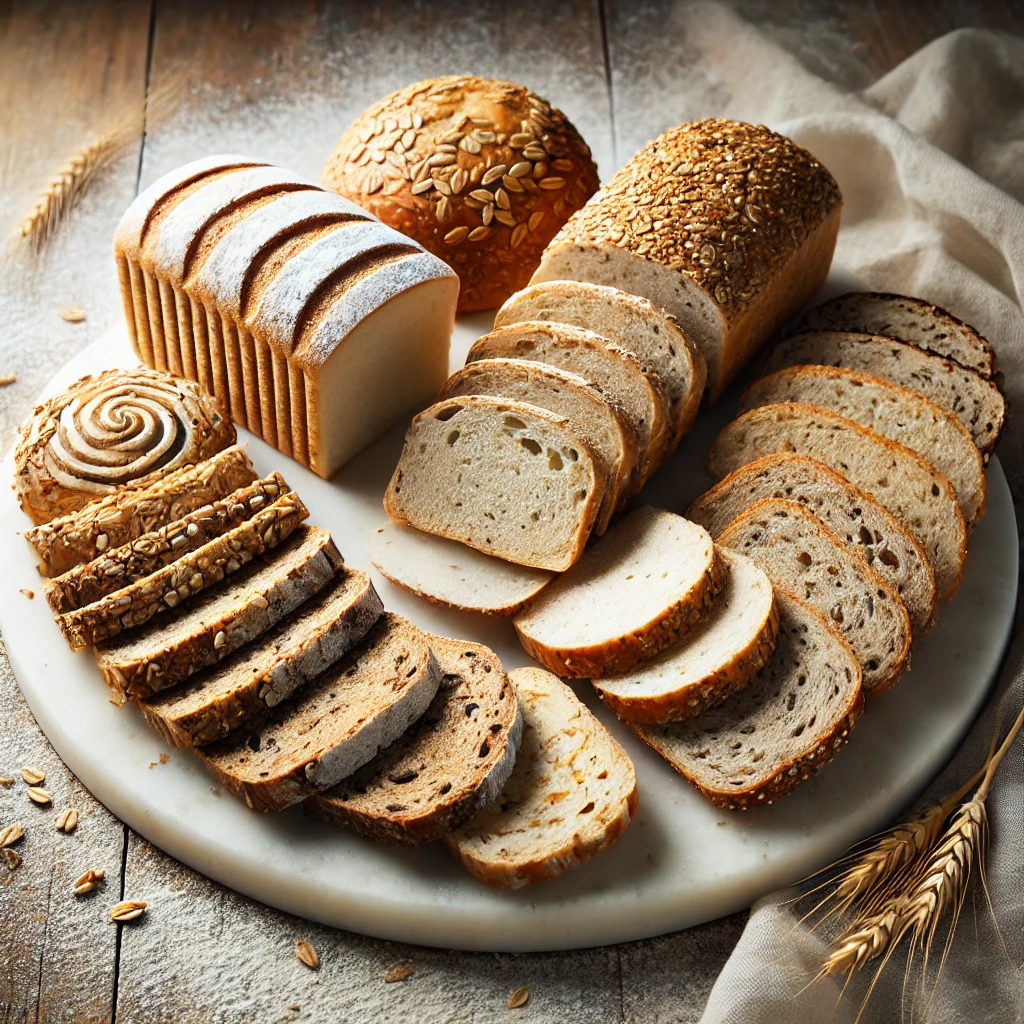
Table of contents
- Introduction: What is Brioche and Bread?
- What is Brioche?
- What is Bread?
- Comparing Nutritional Profiles: Is Brioche Healthier Than Bread?
- Health Risks: Is Brioche Healthier Than Bread?
- Dietary Considerations: Is Brioche Healthier Than Bread?
- Cultural and Culinary Uses: Is Brioche Healthier Than Bread?
- Expert Opinions and Studies: Is Brioche Healthier Than Bread?
- Is Brioche Healthier Than Bread? A Final Verdict
- FAQs
- Conclusion: Choosing the Right Bread
Estimated reading time: 8 minutes
Introduction: What is Brioche and Bread?
When comparing brioche to bread, people often ask, Is brioche healthier than bread? These two baked goods differ significantly in ingredients, texture, taste, and nutritional content. While bread is a staple in many households, brioche is more of a treat, appreciated for its rich, buttery flavor and soft, airy texture. The question about their relative health benefits requires us to dig deeper into their components, calorie counts, and overall impact on health.
What is Brioche?
Brioche is a rich, buttery French bread made with butter, eggs, and sometimes milk. This unique combination results in a soft, airy texture and a slightly sweet flavor. The luxurious ingredients make brioche perfect for both savory and sweet dishes. Bakers knead the dough multiple times to create a tender, buttery crumb. This process gives brioche its distinct softness, setting it apart from the chewy texture of traditional bread.
What is Bread?
Bread, in its simplest form, consists of four basic ingredients: flour, water, yeast, and salt. You can make bread from various types of flour, such as white, whole wheat, or rye. Whole-grain bread, in particular, stands out for its higher fiber content. This fiber helps improve digestion, stabilize blood sugar levels, and reduce the risk of chronic diseases like heart disease.
Comparing Nutritional Profiles: Is Brioche Healthier Than Bread?

When comparing the nutritional content of brioche and bread, we see significant differences in calories, fat, and sugar content. Here’s a breakdown of the nutritional profiles of each:
- Brioche (100g):
- Calories: 330
- Fat: 17g
- Carbohydrates: 40g
- Fiber: 1g
- Sugar: 10g
- Whole-grain bread (100g):
- Calories: 250
- Fat: 4g
- Carbohydrates: 42g
- Fiber: 7g
- Sugar: 1g
From this, we can see that brioche has a significantly higher calorie and fat content due to the butter and eggs. The higher sugar content is another consideration, especially for those concerned with managing their blood sugar levels.
Health Risks: Is Brioche Healthier Than Bread?

While brioche is undeniably delicious, its rich ingredients can contribute to potential health risks if consumed in excess. Here are some key health concerns:
Weight Gain
Brioche contains a higher number of calories due to its butter and egg content. Eating it regularly without balancing the calories elsewhere in the diet can lead to weight gain. For those managing their weight, it’s essential to limit intake of high-calorie foods like brioche.
Heart Disease
The saturated fats in brioche may contribute to increased levels of LDL cholesterol, increasing the risk of heart disease. Although fats are an essential part of a balanced diet, too much saturated fat can be harmful to heart health. If you are concerned about heart disease, it’s better to choose foods lower in saturated fat, such as whole-grain bread.
Blood Sugar Spikes
The sugar content in brioche can cause rapid spikes in blood glucose levels. This is particularly concerning for individuals with diabetes or those at risk of developing the condition. Consuming foods that trigger blood sugar spikes regularly can increase the risk of developing insulin resistance over time.
Dietary Considerations: Is Brioche Healthier Than Bread?
Your dietary needs play a significant role in deciding whether brioche or bread is the better option for you. Here are some dietary considerations:
Low-fat or Low-sugar Diet
For those following a low-fat or low-sugar diet, whole-grain bread is the better choice. It contains fewer calories and fats, and its fiber content aids in digestion and keeps you feeling fuller for longer.
Weight Management
For weight management, whole-grain bread is the better choice. It contains fewer calories, making it ideal for those who want to lose or maintain their weight. Brioche, with its calorie-dense ingredients, should be reserved for occasional indulgences. In contrast, whole-grain bread offers a balanced mix of essential nutrients without adding unnecessary calories.
Heart Health
For those concerned with heart health, whole-grain bread is the healthier option due to its lower levels of saturated fat and higher fiber content. Whole grains help lower cholesterol and promote healthy blood circulation.
Diabetes Management
For people managing diabetes, choosing whole-grain bread is essential. Its fiber content helps regulate blood sugar levels, while brioche’s high sugar content can cause spikes in blood sugar.
Cultural and Culinary Uses: Is Brioche Healthier Than Bread?
Brioche and bread serve distinct roles in the kitchen. Thanks to its rich, slightly sweet flavor, brioche often shines in gourmet dishes and special occasions. You’ll commonly find it in French toast, high-end sandwiches, or as a base for pastries and desserts.
In contrast, bread is much more versatile. It features daily in a variety of savory dishes, such as sandwiches and toast. Whole-grain bread, in particular, is a staple in many cultures and serves as the preferred choice for everyday meals due to its nutritional benefits and versatility.
For those focused on nutrition and health, whole-grain bread makes a better option for regular meals. It complements side dishes, works well in sandwiches, or fits perfectly as part of a balanced breakfast. Brioche, with its higher sugar and fat content, should remain an occasional treat, perfect for indulgent recipes.
Expert Opinions and Studies: Is Brioche Healthier Than Bread?

Nutritionists and health experts widely agree that whole-grain bread is the healthier choice when compared to brioche. A study conducted by the American Heart Association suggests that whole grains should form a core part of a heart-healthy diet. The fiber found in whole grains supports digestion, helps regulate cholesterol levels, and reduces the risk of chronic diseases such as type 2 diabetes and cardiovascular disease.
In contrast, experts recommend consuming rich breads like brioche only occasionally due to their higher fat and sugar content. Brioche may be a special treat, but it should not be part of your regular diet, especially if you are managing weight, blood sugar, or heart health.
For a delicious twist on traditional French toast, check out our recipe for French Toast Without Eggs, which can be made with brioche or regular bread
Is Brioche Healthier Than Bread? A Final Verdict
After evaluating the nutritional content and health impacts of both brioche and bread, it is clear that whole-grain bread is the healthier choice. Brioche, while delicious and indulgent, contains significantly more calories, fats, and sugars, making it less suitable for daily consumption. Whole-grain bread, on the other hand, provides essential nutrients, including fiber and complex carbohydrates, that support digestion, heart health, and blood sugar regulation.
Therefore, if you’re looking for a bread that offers more health benefits, whole-grain bread is the way to go. Brioche can still be enjoyed as an occasional treat, but it should not replace more nutritious options for regular consumption.
f you’re interested in learning more about the cooling process for French bread and how it affects texture, be sure to check out How Long Should French Bread Cool Before Cutting?.
FAQs
Yes, brioche typically has more sugar than regular bread. This is due to the addition of ingredients like butter, eggs, and sometimes milk, which give it a slightly sweet flavor. Brioche often contains more sugar than standard bread, which can range from just flour, yeast, and water.
Whole-grain bread is better for weight loss, as it has fewer calories, less fat, and more fiber than brioche.
Whole-grain bread is often considered the healthiest option. It contains more fiber, vitamins, and minerals compared to white bread. Whole grains help improve digestion, stabilize blood sugar levels, and support heart health.
Brioche can be considered mildly inflammatory for some people, particularly because of its high content of saturated fats from butter and eggs. High consumption of saturated fats has been linked to inflammation in the body, which can contribute to various health conditions. However, occasional consumption should not significantly impact health for most individuals.
Brioche is typically more expensive than regular bread due to the luxurious ingredients used in its preparation, such as butter, eggs, and sometimes milk. Additionally, the time-consuming process of making brioche, which often involves multiple stages of dough resting and kneading, adds to its cost.
Brioche needs to sit overnight to allow the dough to develop its flavor and texture. This resting period allows the yeast to ferment the dough, resulting in a lighter, airier crumb. The long fermentation process helps improve both taste and texture.
Yes, brioche is high in carbohydrates. Since it’s made with flour, sugar, and other carbohydrate-rich ingredients, it contains a significant amount of carbs. Those following a low-carb diet should consider limiting their intake of brioche.
Ciabatta is generally considered healthier than brioche. Ciabatta is typically made with fewer ingredients and does not contain as much butter or sugar as brioche. Its texture is also denser and less rich, making it a more nutritious choice for regular consumption.
Conclusion: Choosing the Right Bread

In conclusion, while both brioche and bread have their place in the kitchen, whole-grain bread emerges as the healthier option for daily consumption. If you’re looking to make healthier choices, focusing on whole grains, fiber, and lower sugar intake should be a priority. Brioche, though rich and indulgent, should remain a special treat for occasional enjoyment rather than a regular part of your diet.
